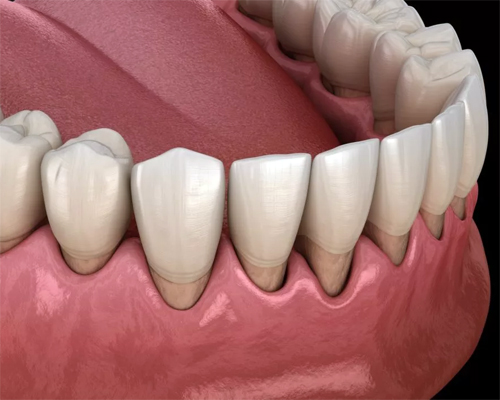Periodontal and Gum Treatment in Sydney
We believe specialists should stick to what they know best. That’s why our periodontist, Dr. Nisha, treats patients with gum disease. It doesn’t matter what level of the disease a patient has – from bad breath, right through to a need for surgery – there’s no one more qualified than Dr. Nisha to help.
Why are healthy gums important?
Healthy teeth rely on healthy gums for support. Gum disease causes sensitivity, pain, bleeding gums, puffy gums, infection and eventually loss of teeth. More teeth are lost through gum disease than through tooth decay.
What is gum disease?
Gum disease, also know as periodontal disease, is caused by plaque, a film of bacteria that forms on the surface of teeth on a daily basis. If plaque accumulates it becomes hard and forms calculus (tartar). The gums react to the build up of bacteria and become red, swollen and inflamed, and the bone which holds the teeth starts to become eroded. If left untreated your teeth will become loose and may be lost.
What are the signs of gum disease?
- Gums bleeding when you brush or eat hard foods.
- Bad breath or a bad taste in your mouth.
- Gum recession (the teeth appear longer) with increased sensitivity to hot and cold
- In the later stages of gum disease gaps may appear between your teeth, become loose and eventually be lost.
Why do I need to see a periodontist?
Your dentist will have referred you to a periodontist if they believe you have gum disease that requires treatment. You may also require implant placement.
A periodontist is a specialist who diagnoses, prevents and treats gum disease and has the expertise to provide treatment to help you keep your teeth for the long-term.
How is gum disease treated?
By thorough mechanical cleaning under the gums of the root surfaces to remove bacterial deposits causing the disease (also known as deep cleaning or debridement). This is usually conducted under local anaesthetic so you feel comfortable. During this phase you will be given instructions on how to clean more effectively around the teeth and gums using toothbrushes and interdental aids.
Advanced treatment with surgery can be undertaken to regenerate and replace lost bone and gum.
What does a consultation involve?
- A discussion about your main concerns.
- A thorough examination of your gums or implant site. This is not painful however you will be aware that detailed measurements are being taken.
- Any necessary x-rays will be taken to complete the full examination.
- Following the examination you will discuss the findings with Dr. Nisha, who will tailor a treatment plan for your mouth and answer any questions.
- You will receive a written report summarising the findings
